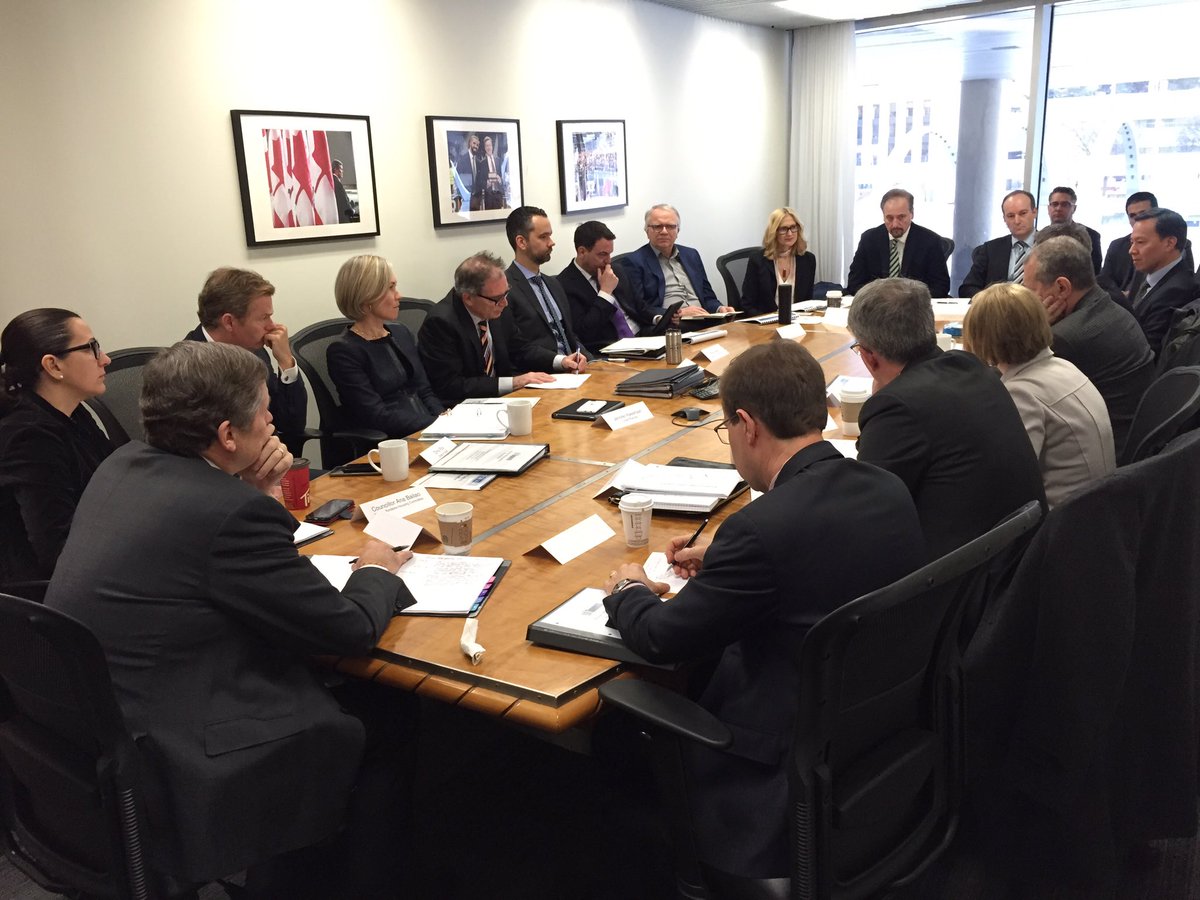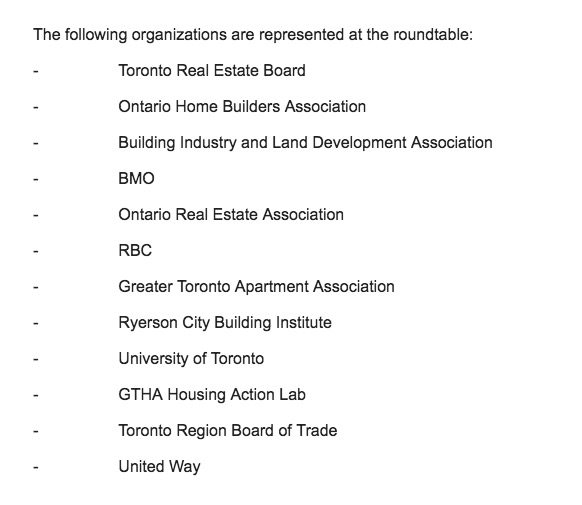The Torontoist: Mayor’s Roundtable Less About Affordable Housing, More About Real Estate
Posted April 5, 2017
Advocates for low-income residents in need of affordable housing were not invited to the table.
Posted April 5, 2017
 For people facing extreme rent hikes on some city condos, mired in astronomical bidding wars on city homes, or languishing on the waiting list for social housing—now nearly 100,000 names long—Toronto’s housing crisis is reaching a desperate apex.
For people facing extreme rent hikes on some city condos, mired in astronomical bidding wars on city homes, or languishing on the waiting list for social housing—now nearly 100,000 names long—Toronto’s housing crisis is reaching a desperate apex.And the struggles of upper-class homebuyers are further compounding the squeeze felt by people across the lower end of the economic spectrum. As buyers are pushed down to less expensive or smaller homes than they’d like, or out of the market entirely and back into renting, they further crowd the rental market.
One-third of the city’s households are in “core housing need,” meaning they spend more than 30 per cent of their income on housing.
With all that in mind, Mayor John Tory convened a roundtable last week consisting of developers, lobbyists, city politicians and planners. The United Way was the only community organization invited to the table.
According to the list of attendees provided by the mayor’s office, those invited to the table included two banks, two home builders’ associations, two organizations representing real estate brokers, and one group representing building management companies.
No one with firsthand experience of housing struggles, or frontline groups, such as Parkdale Legal Services, Toronto ACORN, or Social Planning Toronto, that work directly with affected people, appeared to be at the table.

After the meeting, United Way vice-president Pedro Barata said that he was encouraged by the discussion that unfolded.
“For us, it was very important that the first issue that was raised during the city’s discussion was the issue around low-income affordability and how this has been a long-term crunch that is only deteriorating further as a result of the growth of unaffordability across the population,” Barata said.
However, little of that focus was evident from Tory’s press conference after the roundtable.
Addressing media, Tory focused largely on driving investment, adding to the city’s housing supply, and a possible vacant-home tax, and reiterated several times that he is “not interested in measures which create the false impression of an instant, total solution.” It will be critical to entice more private and public sector investors to buy into the city’s purpose-built rental market, Tory said, naming the federal and provincial pension funds as possible investors. And he expressed the need to make it as easy as possible for developers to “build housing, especially affordable rental housing, but housing of all kinds.”
It was one of the few times he specifically mentioned affordable housing.
In an email statement, Toronto Real Estate Board CEO John DiMichele echoed Tory’s sentiment that there are no easy answers to the city’s housing troubles.
“This is a complex issue and thoughtful and careful consideration of public policy is required,” DiMichele wrote. “In particular, TREB agrees that reliable data, and consultation, on vacant homes is needed before making any decisions in this regard.”
Tory says that adding to the city’s supply of rental housing is among the best ways to address the current situation, “albeit not as quickly as other things that I suppose could be done.”
Toronto’s housing crisis goes deeper than simply having no vacancies. The average rent in Toronto is $1,800 per month for a one-bedroom. That means the gross annual income needed to contribute the recommended 30 per cent towards housing is $72,000. This is challenging when the gross annual salary at Ontario’s minimum wage is only $23,700.
Asked about his refusal last week to support a motion put forward by Councillor Mary Fragedakis (Ward 29, Toronto-Danforth) expressing support for NDP MPP Peter Tabuns’ recently tabled rent-control motion, Tory called the private members’ bills “interesting” and said, “They’re not the way you make public policy, at the end of the day… I didn’t want to be saying I thought this particular private member’s bill was the answer. The answer, or the proposed answer, will come from the government.”
Barata said that building more housing is vital, but that it takes years for projects to be built and be ready for tenants. In the meantime, Barata said, those one-third of Torontonians in core need “urgent solutions ASAP.”
United Way supports three measures to address housing, the first being adding to the supply of rental housing. Then, Barata said, they advocate putting more money into housing benefits as a way to deal with the immediate need many people already have. Those people don’t have several years to wait for new apartments to be built and open up. Finally, they’d like to see an examination of affordable housing—the supply, but also the quality of existing units.
Regarding how to address the needs of the city’s low-income residents, Barata was clear: “We don’t need to do any more research,” he said. “Period on that.”
Other issues in the housing market are outside his expertise, and he said there could be need for further examination into them. But the way to help the people most in need of assistance is clear, and in fact, the City has already settled on a blueprint, including the Open Door program.
“What’s been lacking in terms of moving forward as quickly as we need to on those issues is investment,” Barata said, adding that the federal government says it’s prepared to funnel funds into housing for the first time since the 1990s.
Tory also stressed the importance of having federal and provincial funding for housing, a frequent refrain of his—including when he refused to support an above-inflation increase in property taxes during the City’s budget debate.
***
Article by Tannara Yelland for the Torontoist
